Inbox
We'd like to thank all the participants. Follow the judging progress on #UNGAviz Slack channel or on Unite Ideas Twitter.
Background
The United Nations General Assembly (UNGA) is the main deliberative, policymaking and representative organ of the UN system. Each year the United Nations Member States gather at UN Headquarters to make important decisions, such as those on humanitarian crises and peace and security, which are addressed in UN resolutions.
Since the first General Assembly gathered in 1946, the UNGA has drafted and passed thousands of resolutions. That’s a high number of documents and many voting records to go through in order to gain information on the intricacies of decisions made on issues affecting a vast amount of people worldwide. We want everybody, from the general public to diplomats to have easy and timely access to these formal texts - and maybe even have fun while exploring these records.
Join the #UNGAviz challenge to make the UNGA resolutions easier to access and study in a visually appealing format, and by doing that help the general public to gain deeper understanding on the decisions made by the United Nations.

We Challenge You to:
Create a tool that enables users to search and visualize particular topics on all United Nations resolutions and understand the context and voting patterns around them. The tool should provide a better understanding of the underlying reasons motivating Member States to support or reject resolutions, and should also provide more public transparency about the voting choices by Country representations at the United Nations. It should also have the potential to support policymakers who on a daily basis deal with humanitarian challenges, peace and security issues, and other international affairs, sometimes under extreme time pressure.
Deadline for submissions is 28 February, 2017
Deliverables
‣ A web link (url) to a working (live) demo (suggested: GitHub Pages or BitBucket Pages, or similar). The web front-end should make use only of HTML, javascr1pt and stylesheets.
‣ A repository of the original open source code, data files, and other electronic files (include GNU license). This package can be hosted in a public repository and should allow OICT or UN Member States to run the tool in local servers.
‣ A brief document describing the functionalities, such as a user guide.
‣ A document describing the steps to update the tool with future resolutions, such as an admin guide.
Datasets
1. GA Resolutions
GA resolutions and other UN official documents can be downloaded here:
‣ UN Search - Official Document System
2. GA voting records
Voting records can be obtained here:
‣UNBISnet (United Nations Bibliographic Information System)
More information on the voting records can be obtained on Dag Hammarskjöld Library website.
3. Quick start datasets
Get started with these datasets (votes.csv and GA_Resolutions.zip) extracted from the official sources above. These unofficial datasets are available thanks to the work of Kevin Alberstson at the Infoseeking lab, Rutgers University.
Prizes & Recognition
This challenge will be an opportunity to engage in a collaborative project with the United Nations Office of Information and Communication Technologies (OICT) and the U.S. State Department. The winning solution will be made public and shared with interested United Nations bodies and UN Member States. The #UNGAviz challenge winner will:
‣ Receive a recognition letter from the U.S. State Department and acknowledgement by the United Nations Chief Information Technology Officer, Assistant Secretary-General, Office of Information and Communications Technology, Department of Management;
‣ Be acknowledged on the U.S. State Department website;
‣ Be featured on websites (un.org, etc.) and publications for the general public and Member States. The best solutions might also be featured at events organized by the UN;
‣ Possibility to stay on the project in an advisory role.
‣ Possibility to write a blog post on the project on the Unite Ideas website.
Review Process
The judges will review the submitted solutions within three weeks after the closure of the challenge. Qualified submissions will be judged on a combination of the following criteria:
1. Usability - the ease of use and user-friendliness of the submission.
2. Accuracy - the degree the results of the tool are correct.
3. Insights - the degree the results and visualization by the tool are useful and presented in a creative manner in providing insights in the data.
4. Modularity - the ease of customization enabled by the solution.
5. Elegance - the elegance of the code written and the quality of documentation provided.
6. Documentation - quality of the documentation provided alongside with the code.
#UNGAviz Judging Panel
The committee including representatives from the U.S. State Department and the United Nations OICT will judge the results of this challenge. The judges will review the submitted solutions based on the expected deliverables.
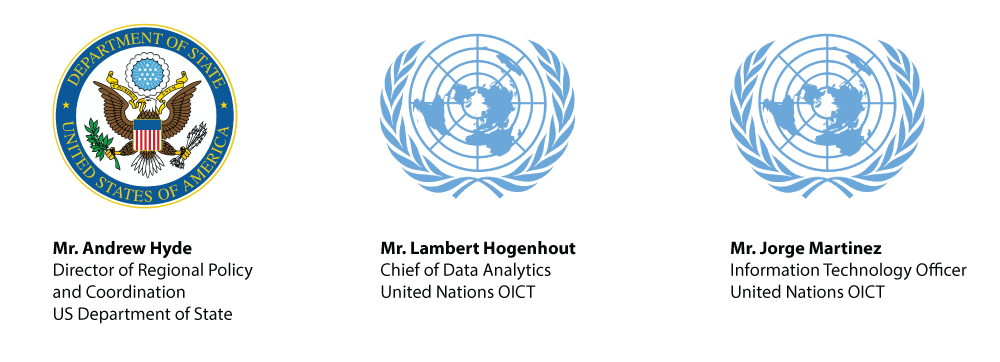
Submission guidelines
‣ This challenge is open to the general public. Public, private, and academic organizations are also invited to take part.
‣ Participants should submit the final challenge submissions (suggested: GitHub Pages or BitBucket Pages, or similar) through the Unite Ideas website by the challenge deadline.
‣ Only original, open source work will be accepted. It is acceptable that your solution uses other existing open source libraries.
‣ Submissions are welcomed in all 6 official UN languages (Arabic, Chinese, English, French, Russian and Spanish).
‣ Teams can submit by acknowledging all contributors under the “description” field on the submissions form.
‣ There are no limitations on the number of submissions per participant/participating team.
‣ The participants are required to agree on the terms and conditions.
For any questions regarding the challenge, please contact the Unite Ideas team at uniteideas@un.org
View winning solutions
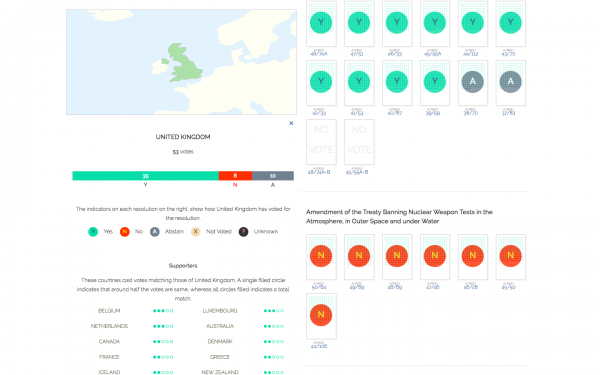 |
Global Policy1st place Mr. Abdulqadir Rashik "Global Policy" aims to provide a better understanding of the policy making process surrounding any particular topic by providing decision makers insights into three key areas.
The analysis is presented such that the decision maker can easily navigate from analysis of one aspect to another to gain a comprehensive understanding of the subject. » General Overview and User Guide |
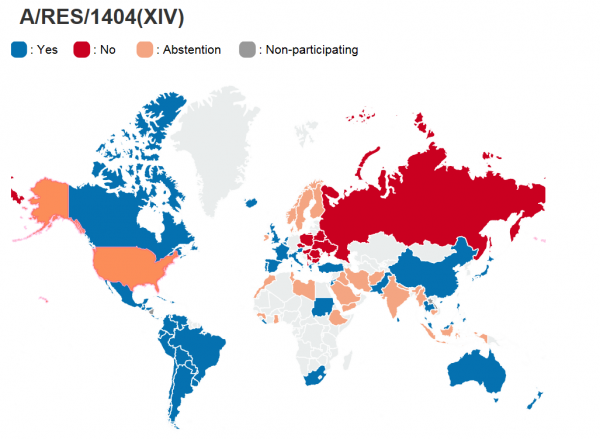 |
UNGA Resolution Explorer2nd place Mr. Maximiliano Lopez His application is multilingual and provides a user-friendly interface with authentic search capabilities in English, French and Spanish. The application makes use of Information Retrieval libraries (Apache Lucene) allowing users to find resolution on the basis of terms. Resolutions may also be filtered on the basis of their date and the availability of voting records. |
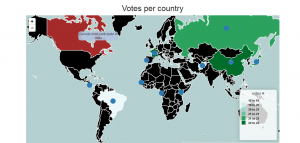 |
UN General Assembly Resolution Explorer3rd place Mr. Thomas Fournaise UN GAR explorer allows people to navigate in the resolutions to show which country voted what on each resolutions. It also allows to show correlation and some ther elements on the different graphs. |
Challenger organization:
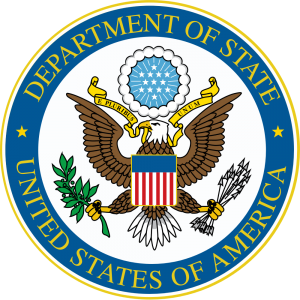
U.S. Department of State
As the lead U.S. foreign affairs agency, the U.S. Department of State represents the United States at more than 270 diplomatic locations around the world, including embassies, consulates, and missions to international organizations.
The Secretary of State, the ranking member of the Cabinet and fourth in line of presidential succession, is the President's principal advisor on foreign policy and the person chiefly responsible for representing the United States abroad. The primary goal of the Secretary of State and the U.S. Department of State is to shape a freer, more secure, and more prosperous world through formulating and implementing the President's foreign policy, while supporting and protecting American interests abroad.

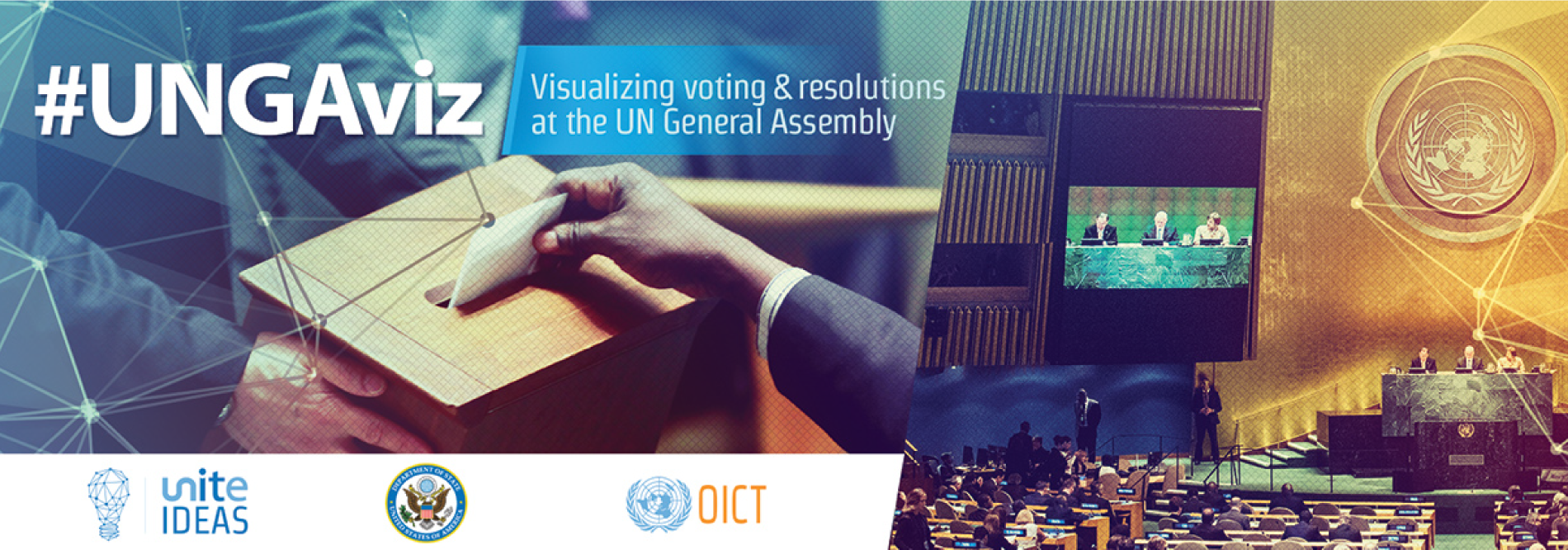
Help to Improve This Idea.